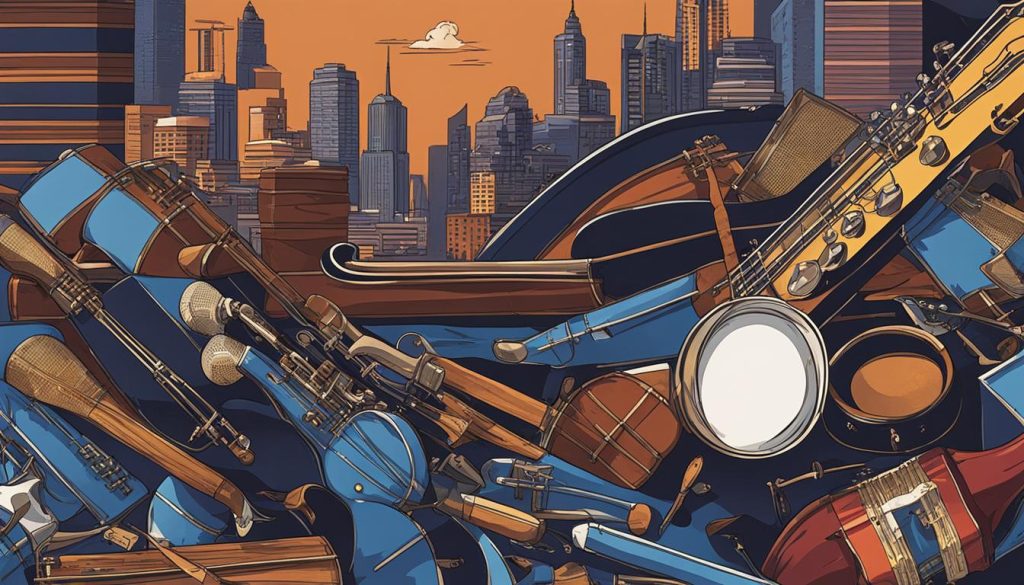Exploring the Soulful Depths of Southern Blues Music
Tracing the Roots: From African Traditions to the Mississippi Delta
The origins of Southern blues can be traced back to the musical traditions brought over by African slaves. It is a genre born out of hardship and struggle, forged in the cotton fields and work camps of the Deep South. The Mississippi Delta, in particular, played a pivotal role in the development of the blues, serving as a hub for musicians and a source of inspiration.
The sounds of the Delta were heavily influenced by West African rhythms and the call-and-response patterns of field hollers. The style evolved and matured over time as musicians brought their own unique experiences and influences into the mix. The result was a distinctive blend of African and American musical traditions.
The blues is a tonic for whatever ails you. I could play the blues and then not be blue anymore.
Musical Roots in Africa
The African roots of the blues can be traced back to the griots of West Africa, traveling minstrels who sang of history, culture, and morality. This oral tradition is still visible in the blues through the prevalence of storytelling and the use of call-and-response singing.
Mississippi Delta: A Hotbed of Blues
The Mississippi Delta served as a crucible for blues innovation, nurturing a new generation of musicians and spreading the sound throughout the Southern states. The region’s isolation, lack of commercialism, and unique musical traditions gave rise to the raw, authentic sound that still defines the genre to this day.
As the popularity of the blues grew, musicians began to incorporate other musical influences and styles, such as jazz and swing. The result was a varied and complex musical landscape that continues to captivate listeners.
The Birth of Delta Blues: Delta’s Impact on Southern Sound
The origins of Delta blues can be traced back to the African traditions brought over by slaves to the Mississippi Delta region. In the late 19th and early 20th century, African American musicians began to incorporate these traditions into their music, paving the way for the birth of Delta blues.
At the heart of this movement were influential musicians such as Robert Johnson, Son House, and Charley Patton. Robert Johnson, in particular, is known for his unique guitar playing style and haunting vocals, which have become iconic in the world of blues music.
The impact of these musicians on shaping the distinctive Southern sound cannot be overstated. The Delta blues genre is characterized by its raw, emotional power and lyrics that often deal with the struggles and hardships of everyday life.
“I went down to the crossroads, fell down on my knees. I went down to the crossroads, fell down on my knees. I asked the lord above, ‘have mercy, save poor Bob if you please.'”
“The blues tells a story. Every line of the blues has a meaning.” – John Lee Hooker
The legacy of Delta blues continues to influence and inspire musicians around the world to this day, cementing its place as a cornerstone of American music.
Legends of the Southern Blues: Pioneers of the Genre
Throughout history, there have been many iconic Southern blues artists who have left an indelible mark on the genre. From the soulful, expressive sounds of B.B. King to the gritty, raw energy of Muddy Waters, these pioneers embody the essence of Southern blues and have influenced countless musicians across generations.
![]()
Perhaps one of the most legendary figures in Southern blues is B.B. King, who rose to international fame after the release of his hit single “Three O’Clock Blues” in 1951. Known for his emotive vocals and incredible guitar skills, King is widely regarded as one of the greatest blues musicians of all time.
Another influential blues figure is Muddy Waters, who developed his trademark style at the heart of the Chicago blues scene in the 1940s and 1950s. His gritty, electric sound and emotionally charged lyrics continue to inspire blues musicians around the world.
The Impact of Iconic Southern Blues Artists
These iconic artists paved the way for future generations of musicians, expanding the genre and pushing the boundaries of what was possible. Beyond their musical contributions, they also played a significant role in shaping American culture and helped give voice to marginalized communities.
“The blues is the roots, everything else is the fruits.”
This powerful quote from Willie Dixon, Grammy-winning composer and one of the most prolific songwriters of his time, encapsulates the profound impact of the Southern blues on American culture. From folk and rock to jazz and hip-hop, the influence of the blues can be heard in a wide range of musical genres.
Regional Variations: Exploring Different Styles of Southern Blues
As with any genre of music, Southern blues has its own regional variations that have developed over time. Each region has its unique characteristics and style that make it stand out from others.
One of the most famous styles of Southern blues is the Chicago blues, typically known for its soulful and sophisticated sound with a focus on piano and horns. The style emerged from the migration of African Americans from the South to the urban centers of the North in the 1930s and 1940s.

“Chicago is known for its sophisticated sound with a focus on piano and horns”
Another famous variation of Southern blues is the Delta blues, which originated from the Mississippi Delta in the 1920s and 1930s. This style is characterized by its raw, emotional sound and typically features solo performers on guitar and harmonica. Robert Johnson, Son House, and Charley Patton are just a few of the influential Delta blues musicians who helped shape the sound of the genre.
“Delta blues is famous for its raw, emotional sound and solo performers on guitar and harmonica”
Texas blues, on the other hand, is known for its lively and energetic style, often featuring electric guitar and a faster tempo. This style originated in the post-World War II era and has influenced many other genres of music, including rock and roll.
“Texas blues is characterized by its lively and energetic style and featuring electric guitar and a fast tempo”
Other regional styles of Southern blues include the Piedmont blues of the southeastern United States, which features a more ragtime-influenced sound with fingerpicked guitar, and the New Orleans blues, which is characterized by its use of brass instruments and emphasis on rhythm and blues.
By exploring the different regional styles of Southern blues, one can gain a deeper appreciation and understanding of the genre’s rich history and unique characteristics.
Understanding the Enduring Legacy of Southern Blues
Southern blues music’s legacy is enduring, shaping the sound of American music and permeating the country’s cultural identity. The genre’s impact on American culture is immeasurable, with its influence felt in every corner of the country and beyond.
The cultural significance of the blues is rooted in its origins, where African Americans’ experiences were captured through music, conveying a sense of struggle and resilience. From the earliest Mississippi Delta blues to the electrifying Chicago blues, the genre’s sound embodied the experience of Black Americans in the south, making it an essential part of American history and culture.
The impact that Southern blues has had on American culture is readily apparent in the music of today. The blues influence can be seen in rock, hip-hop, jazz, and other genres, shaping the sound of popular music for generations. From Jimi Hendrix to The Rolling Stones, Southern blues has inspired and influenced some of the most significant musicians of our time.
The enduring legacy of Southern blues reminds us of the rich cultural heritage of the American South and the importance of preserving and honoring this legacy. Its timeless themes of hardship, heartbreak, and triumph continue to resonate with audiences worldwide, maintaining its relevance and significance in today’s musical landscape.
FAQ
What is the significance of African musical traditions in the origins of Southern blues?
African musical traditions played a crucial role in the development of Southern blues music. The enslaved Africans brought their rich musical heritage to America, influencing the creation of new musical forms, including the blues.
How did the Mississippi Delta contribute to the birth of Delta blues?
The Mississippi Delta, known as a hotbed of blues innovation and creativity, played a pivotal role in the birth of Delta blues. The region’s harsh living conditions and deep-rooted musical traditions contributed to the formation of the distinct Delta blues sound.
Who were some influential Delta blues musicians?
Some influential Delta blues musicians include Robert Johnson, Son House, and Charley Patton. These artists played a significant role in shaping the Southern sound and their contributions had a lasting impact on the blues genre as a whole.
Who are some iconic Southern blues artists and pioneers of the genre?
Iconic Southern blues artists such as B.B. King and Muddy Waters are considered pioneers of the genre. Their musical innovations and powerful performances helped popularize the blues and paved the way for future generations of musicians.
What are the regional variations in Southern blues?
Southern blues exhibits diverse regional variations, with each area having its own unique characteristics and styles. From the soulful sounds of Chicago blues to the raw energy of Texas blues, exploring these different styles provides a rich tapestry of Southern blues music.
How has Southern blues influenced American culture?
Southern blues has had a profound impact on American culture. The genre’s emotional depth, storytelling prowess, and musical innovations have influenced a wide range of musical genres, from rock ‘n’ roll to jazz. The enduring legacy of Southern blues continues to shape and inspire musicians today.
